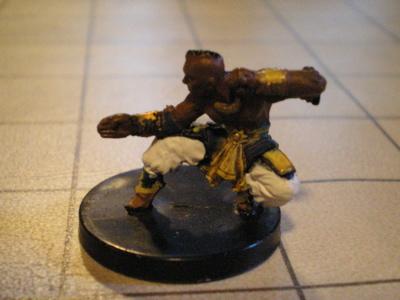 |  |  |  |  |  |  |  | ||
 | |||||||||||
 | Hall of Stone Campaign: | ||||||||||
References in parentheses are to books and pages.
Your Clan You are a member of the Hall of Stone (or Stonehall) clan. You are the most noble of all mid-caste clans, and the mid-caste clans are the heart and soul of the Empire. Your kin are mostly soldiers, scribes, priests, and merchants; but there are all sorts of less common occupations as well. (Tek 11).
Your City You live in the Hall of Stone clanhouse in Jakálla, an ancient and decadent tropical port and provincial capital. (Tek 150)
Looter You are a looter, or you’re about to become one. You sneak down into the underworld to find secrets or treasures that you can use to enrich and support the clan. You have to sneak because the high clans don’t want middle-clan people in the underworld. You might well trespass into ancient chambers reserved for the high clans. But you might also find secrets and treasures that would give your clan power relative to the other clans, and so your leaders send you into the underworld. Most of your kin don’t know you’re a looter. Probably no one outside the clan does. Looters are mostly competent young men. As competent young men, you might be asked to perform other services aboveground as well. Aboveground, you must be able to navigate the complicated and dangerous web of social obligations that is life in the Empire of the Petal Throne. You must have capabilities that make you worthwhile as a looter. Most likely, these capabilities correspond closely to the ability to kill and not be killed. You will also need social capabilities (but we’ll worry about that after the first adventure).
Your Age Unless you have a good reason otherwise, you are a young adult, old enough to have proved yourself exceptional to the clan heads, young enough not to have founded a career. You are the ideal age for a looter, young, strong, and expendable.
Your Gender The following are options for player-character genders. 1. Man. This is most of you. Men lead the clan, especially in dealing with other clans. A man is expected to have a wife, perhaps more than one. Young, promising men, however, often delay marrying. They hope first to make their fortune and boost their status. Then they can win the hands of several women, or a single very wealthy or attractive one. Men are the best gender. If two men were to have sex with each other, it would be the sort of thing that others would shake their heads or roll their eyes over. 2. Aridáni. I wouldn’t mind one or two aridáni in the party. Dalton has dibs. An aridáni is a woman who has realized that it’s better to be a man. She has legally adopted the status and role of a man, and she can even marry multiple husbands. Plenty of men regard aridáni as interlopers who need to be put in their place in no uncertain terms, but the code of noble action means that aridáni get treated approximately like men. It’s common wisdom that there’s something a little wrong with a man who’d marry an aridáni. Some aridáni marry women. 3. Tlámisu. Some men are so devoted to their careers that they sacrifice their very manhood to devote themselves to their work. Many of these former men are scholars priests, scribes, and sorcerers. Some tlámisal are set on this path while still boys.
The following gender options are not available. 1. Woman. They stick to the clanhouse. They are the treasure of the clan (in other words, precious property). Wives are faithful to their husbands. It wouldn’t really be possible for two women to have sex because there’s no man involved. 2. Víssya. Some men are so cowardly or lazy that they voluntarily give up their status and become women. They are even taken in marriage by men. What kind of man is it who’d rather be intercoursed up the rear than do a man’s work? It would be an outrageous scandal for two víssyoi to have sex with each other instead of with men. 3. Boy. Destined to take a man’s role in the clan, but for now mostly an annoyance. Might be betrothed to a girl. 4. Girl. Destined to take a woman’s role in the clan, probably betrothed to a boy or to a man.
Your Marriage Here are some possible marriage arrangements you could be in. 1. Unbetrothed. You were probably betrothed around age 5, but the betrothal was broken off for some reason. Maybe you thought you could do better and accepted the scorn of your family in exchange for your freedom from the betrothal. Maybe your betrothed was killed by a Black Stone man. Maybe you committed an ignoble act that annulled the betrothal and cost your family dearly. Betrothed men consider you a threat, since you might seduce their betrothed and cause a rupture in the betrothal. Plus, they envy you because you’re free. 2. Betrothed. You’re promised in marriage, but you’re not married yet. It’s unusual that you haven’t married. Maybe there’s a problem. Maybe it’s you. Maybe you’re many tsan away from your betrothed, and maybe you’re fine with that. 3. Married. You are now tied to this clanhouse, because that’s where your bride lives. You don’t necessarily have much to do with each other on a day-to-day basis. People work together in the clanhouse, so your wife sees more of your sisters (or sisters-in-law) and female cousins than she sees of you. All manner of hilarity can result from matrimony, as some of us well know. 4. Married to an Outsider. As above, but your wife is from another clan. She lives in your clanhouse. Sure as the sun is hot, she catches nothing but grief from the “real” clanwomen. 5. Divorced, Widowed, etc. Less likely but possible.
Your Status Even within the clan, there are high and low status lineages. You are all of roughly the same level, which means one of the following (or something). 1. Promising Youth. You’re from an average lineage, but you’re above average and have caught the attention of the clan leaders. 2. Renegade. You’re from an superior lineage, but you’ve transgressed enough (or gotten caught enough) that you wind up only welcome among your inferiors. 3. Underdog. You’re from a low lineage, but you shine so bright that middle-lineage men accept you.
Your Personal History Anything that could have happened to a young man could have happened to you. But here are some possibilities that might be better than others Had your heart broken. Had your fortune stolen. Had to execute a family member. Forced to repay a family member’s debt (especially a father’s). Adopted from another clan. Undermined socially by a rival (maybe a Black Stone man). Survived the disastrous military incursion into the swamps against the Hlutrgu (EPT 48). Was taken under the wing of an esoteric tutor. Broke somebody’s heart. Stole somebody’s fortune. Made enough enemies elsewhere that it was prudent to relocate to Jakálla. Recruited in to a secret society. Infamous for an ignoble act that you didn’t actually do.
Your Career As a man in good standing with the clan, you have a career assigned to you by the clan leaders. “Looter” is not a career. Most of your kin do not know that you’re a looter. You need a regular career in the clanhouse. Maybe it’s a real career. Maybe it’s a cover. Here are some possibilities. Expert. You’re an expert at something, and you lead that activity in the clanhouse. Maybe you train youths in combat or scribing. Maybe you’re good with chlen-beasts and work in the stables. Functionary. Your career has practically nothing to do with your skills, and it’s a constant distraction. Someone has to oversee the warehouse, and maybe that’s you, even though you have no real facility with that role. Sinecure Holder. One way or another, you’ve managed to land a plum position, something that requires very little effort, perhaps even a purely symbolic or vestigial post.
Your “Class” Here’s what you could be, just as ideas. These in no way need to be exclusive. A “sorcerer,” for example, could have abilities that would fit best under the “monk” category, or whatever. Sorcerer. You have learned to use your mind to control extraplanar energies. Spells take real effort to cast, but they give you great power. A sorcerer needs a high pedhétl. The pedhétl is both one psychic reservoir and one’s passions, so sorcerers tend to be driven and charismatic, even more than priests. Cleric. You are a priest trained in the temple, both in the knowledge of your Lord but also in the ways of spells. Like a sorcerer, you need a strong pedhétl, but thanks to temple training sometimes even a priest of average talent can cast powerful spells. If you are a priest in the service of one of the Lords of License, then you’ve probably been thwarted in your career by priests from the Black Stone clan, cursed be their loins. Paladin. Really more of a champion of a Lord and the Lord’s Temple, with martial training plus combat-oriented spells. Fighter. The Empire and its provinces have an array of legions and other military regiments, any of which you might have belonged to. If so, you can keep your arms and armor. As a soldier, you probably have some supernatural assistance, such as a demonic talisman that aids you in battle, a magic weapon, some spells you picked up. Rogue. Not many people get trained to sneak around, find things out, get into secure locations, steal valuables, or assassinate enemies, but some do. They’re very likely to have some magical resource to help them. Monk. A very few people are trained in the arts of channeling extraplanar energy into a through their bodies. Those who have some training may well have gotten in in some foreign land. Ranger. There’s no wilderness to speak of for a hundred tsan in any direction. Humans have lived on this land for tens of thousands of years, and it’s pretty well beaten down. Druid. Not really.
| |||||||||||
Xen-Met Not pictured are his steel kukri, with which he carves stone. | |||||||||||